Cardiff Council has agreed to conduct a feasibility study to determine if a clean air zone (CAZ) is needed in the city.
The move follows legal direction from the Welsh Government, which agreed to take action to tackle illegal levels of air pollution in the country at a hearing at the High Court recently.
The Cardiff Council report states that "poor air quality is now considered the largest environmental risk to public health in the UK", and that there is "clear scientific evidence" linking exposure to pollution to reduced life expectancy.
Cabinet Member for Strategic Planning and Transport, Cllr Caro Wild said: "The latest figures from Public Health Wales suggest that the number of deaths per year that can be attributed to poor air quality has increased to over 225 across Cardiff and the Vale of Glamorgan, so improving the air we breathe has now become a matter of life or death.
" Welsh Government has now directed us to carry out a clean air feasibility study which will identify the issues in Cardiff.
“We already know that our transport system needs to change and in our recently published Green Paper on Transport and Clean Air we started a conversation with the people of Cardiff about a range of ambitious, but achievable possibilities, that could change the way we move around Cardiff.
"A clean air zone is something we might very well need to consider if, as we have been directed, we are to deliver compliance with legal limits for air quality in the shortest possible time.”
Cllr Wild said that CAZs have proven to be “an effective way of reducing air pollution” in cities across the world, but admitted that they all look slightly different.
Some, he said, such as those in Stuttgart and Berlin ban the most polluting vehicles, whereas London have introduced a Toxicity Charge which targets the most polluting vehicles with a charge.
"What is important to us is to have a conversation with the people of Cardiff about how changes might affect them, so we can try and ensure fairness and equality is central to decision making,” he said.
“We would urge people to join in the conversation around our green paper and have their voices heard."
The legal direction received from Welsh Government means that by June 30 2019, Cardiff Council must identify options for delivering compliance with legal limits for nitrogen dioxide in the shortest possible time.
The council has launched a green paper on clean air in the city and is urging residents to take part in the conversation about the big ideas that could shape the future of Cardiff's transport system and the way the city could look and feel in the future.
The Transport & Clean Air Green Paper is available to view on www.cardiff.gov.uk/transportgreenpaper. The consultation closes on July 1.





















Login to comment
Comments
No comments have been made yet.